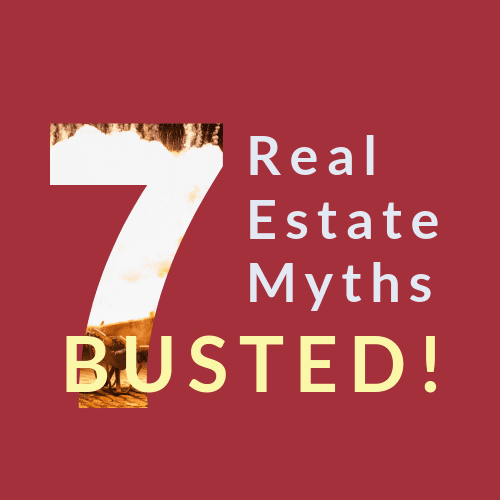Myths have been around since the first sunrise came up over the horizon. Busting myths through learning must have also been around for that long, or it’s safe to say we all wouldn’t be around right now. It’s no surprise then that any talk about real estate brings up some non-truths that need to be rectified. It happens in every profession, of course, we’re sure that doctors sit at tables in restaurants and their ears prickle as the talks behind them turn to medicine and ailments. It’s probably no surprise that many doctors have lost their appetites over the silly myths people have about health. Child rearing is no different. How many home remedies that make no sense are handed down throughout families, towns, countries, and nations on what’s best for the average child?
They’re no harm for the most part, but sometimes they can cause real damage. Take real estate buying and selling for instance. Many home buyers and sellers have lost out on their dream properties because they were told a myth that wasn’t true.
Here are seven of the most popular ones we hear as Realtors® hear every day and every day we have to educate those around us with the truth.
Myth: All You Need is a Down Payment
But just because you need less up-front than home buyers of yesteryear, it doesn’t mean that you should start home shopping with no savings! You may be able to get the seller to carry closing costs, but there’s no guarantee that will be the case. Further, you’re almost guaranteed to run into expenses with your new home. Repairs, improvements, moving expenses—all of these and more mean that you should have money set aside when you move in. Experts normally suggest around $3,000, but the exact amount will vary with your specific situation.
Myth: School District is Irrelevant to Those Without Kids
It’s a fact: homes in more desirable school districts cost more. This means that even if you don’t have children when it comes time to sell your home, you’ll be in a stronger position if you’re in a good school district. So don’t buy the myths that schools, parks and rec centers only impact those who use them.
Myth: Owning a Home is Like Minting Money
One of the more persistent myths when it comes to home ownership is the idea that buying a home is a guaranteed positive investment. While it’s certainly true that home values tend to increase, that is not always the case. Further, some studies show that depending on where you live, you may be better off renting, and putting the money you save into an investment account.
The caveat is that it requires you to have the discipline (and luck) to be able to consistently set aside that gap between rent and mortgage costs. Paying against the mortgage is like having a forced savings account, and that wealth slowly but steadily builds up over time. It’s a great way to set aside savings, but that should never be the primary reason to buy a home. And of course, if you can find a few extra dollars, you can still invest.
Myth: Drop Your Insurance After Your Mortgage is Paid
Most mortgages require specific amounts of insurance to be carried by homeowners. It’s certainly aggravating to be required to spend money, but mortgage companies don’t do it just to be irritating. They require insurance because a home is a terribly expensive thing to replace. Far too many homeowners finally managed to pay off their mortgage and owned their home free and clear bilaterally to suffer a tragedy due to fire or natural disaster. Their loss is compounded when it’s discovered that they dropped their homeowners’ insurance once they were no longer required to have it.
Insurance payments may feel like money going out the door, but that’s only when you don’t need it. And when you do? Well, then it’s too late.
Myth: Your Mortgage Payment is Your Only Expense
Far too many homeowners neglect to consider the holding costs involved in owning and maintaining a home. Most people think they’re accustomed to accounting for utilities in their budget, but they may forget about trash collection and water, which landlords often cover. There are also ongoing repairs and expenses that come with being a homeowner, and those may take new buyers by surprise.
Like many of the myths on this list, the best approach is to be as informed as possible. Actively question your home inspector or other construction and maintenance pros about what kind of repairs and maintenance you should expect, and budget accordingly.
Myth: Vacation Homes are a Waste of Money
This is one of those myths that’s held by experienced homeowners as well as newcomers. Owning a vacation home takes a different mindset than owning a personal residence. But that doesn’t mean that they have to be a losing proposition! Vacation homes are often located in high-demand areas and are rented out on a nightly basis at tourist rates, meaning that even moderate occupancy can allow you to break even on the mortgage payments.
The trick to owning a vacation rental is approaching it as a business. When building a budget, factor in expenses for marketing, housekeeping, management, furnishings and guest supplies such as paper towels or bottled water. But there’s one other major factor to keep in mind: chances are you and your family will use that vacation home as well! For many people, a vacation home that breaks even or loses some money is still worth it in the long run, if it allows them to have their own property in their dream destination.
Myth: You Can Time the Real Estate Market
Those who’ve been in the property business for any substantial amount of time can recall neighborhoods that were supposed to “pop” for years or even decades, but for some reason never got started. All the buyers who’d moved in expecting a windfall were disappointed, even if their individual home was perfectly fine. Concentrate on finding the right home for you and your family, instead of trying to win the housing lottery, and you’ll be much happier in the long run.








0 Comments